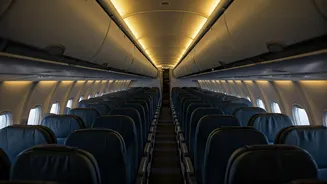Flight Disruption Unfolds
An Akasa Air flight, initially scheduled to travel from Bengaluru to Delhi, experienced a considerable setback due to the actions of a single passenger.
Reports indicated that the passenger was inebriated and instigated a confrontation with a fellow traveller. The situation quickly escalated, impacting the flight's schedule and the experiences of other passengers. The airline staff attempted to manage the situation and ensure the safety of everyone on board. However, the passenger's unwillingness to cooperate led to a prolonged delay, frustrating both the crew and the other passengers who were eager to reach their destination. The incident highlights the challenges airlines face when dealing with disruptive behaviour mid-flight and the processes used to try and resolve them.
Argument and Delay
The primary cause of the flight's delay was a heated exchange between the intoxicated passenger and a fellow traveller. Details of the argument suggest that the passenger's actions created a hostile atmosphere within the aircraft. The crew attempted to mediate the dispute but were met with resistance. As a consequence, the flight could not depart as scheduled. The incident resulted in significant disruption. Passengers had to wait while the situation was assessed and dealt with. Such occurrences underscore the importance of passenger behavior and how it can affect the overall travel experience for many. The airline, in this case, was required to prioritize the safety and security of all on board while also managing the practical issue of delayed travel for those unaffected by the problem.
Incident Aftermath and Response
Following the incident, the Akasa Air flight was delayed for an extended period, causing considerable inconvenience. The airline’s staff had to take appropriate steps to deal with the situation. The exact resolution of the situation with the unruly passenger remains unclear, however, the primary objective was to ensure the safety of all those involved and to uphold regulations regarding passenger conduct on a flight. The incident drew attention to the challenges faced by airlines in maintaining order. It highlighted the essential need for clear protocols and well-trained staff to handle such situations. Furthermore, it reminded the public of the impact individual behaviour can have on the collective travel experiences of others, and the repercussions for those who act in a disruptive manner.













